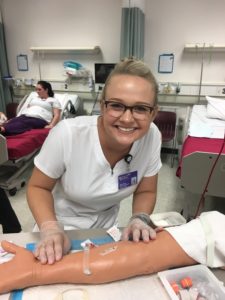The social media world is in an uproar over the recent comment from Washington State Senator Maureen Walsh who claims “they (nurses) probably play cards for a considerable amount of the day.”

Emma Ward, senior nursing student practices starting an IV to prepare her for real patients. Photo by Mary Huggins.
Walsh made this comment during her speech where she was pushing for an amendment that would mandate uninterrupted meal and rest periods for nurses. After her statement, the Twittersphere was quick to respond, negatively of course. The comment even brought about a trending hashtag #nursesplayingcards.
While many memes or jokes were created around the trending hashtag, the nursing world has been quick to defend themselves.
The bill regards enforcing mandatory rest breaks for nurses during their shifts. Nurses say this will be a hard one to enforce.
“I don’t think mandatory rest breaks are a good option because you never know what is going to happen on the floor at any given moment. I couldn’t imagine being clocked out for 30 minutes when a patient on the floor may need me,” says Christy Berry, a registered nurse clinical manager out of Asheville, NC.
A survey from the Vickie Milazzo Institute also doesn’t support Walsh’s claims. The survey that included 3,312 nurses shows quite a different story.
- 64% of nurses “rarely get 7-8 hours of sleep in a night, with 33% specifying that they ‘hardly ever’ get this much sleep at night.
- 77% said they “do not regularly eat properly” while 31% “rarely eat at least two balanced meals per day.”
- 82% reported that they “feel that it is difficult to strike a work-life balance, while 28% ‘always’ have work on their mind.”
- 57% say “it can be difficult to receive the help of others at their workplace.”
According to the American Association of Colleges of Nursing, the U.S. is expected to experience a shortage in nurses as the Baby Boomer Age and demand for health care grows.
Western Carolina University’s nationally ranked nursing program works to send more nurses out in to the world to counteract this problem.
Nursing students at Western Carolina University endure the rigor of nursing before even entering the professional world. While in the program students are expected to meet the following requirements that will prepare them for the nursing scene:
- Take a full course load with the inclusion of hundreds of hours of clinical work
- Maintain a minimum of a 77 exam average
- Complete evidence-based practice research projects
- Complete 120 hours of “TTP” (transition to practice)
Colby Crawford is a third-semester nursing student at WCU. Crawford plans on graduating in December 2019 with his Bachelor of Science degree in Nursing.
“Every specialty, from emergency medicine to pediatrics, can be dramatically different in their nature. The one thing that remains true is that we all work hard and we truly care for the lives we have in our hands,” says Crawford.
Crawford’s peer and aspiring nurse, Emma Ward, shares her observations of nurses on the scene and the true chaos they are subject to given the unpredictability of their profession.
At the end of all the controversy and backlash, Walsh agreed to shadow a nurse to learn the breadth of what they do.


